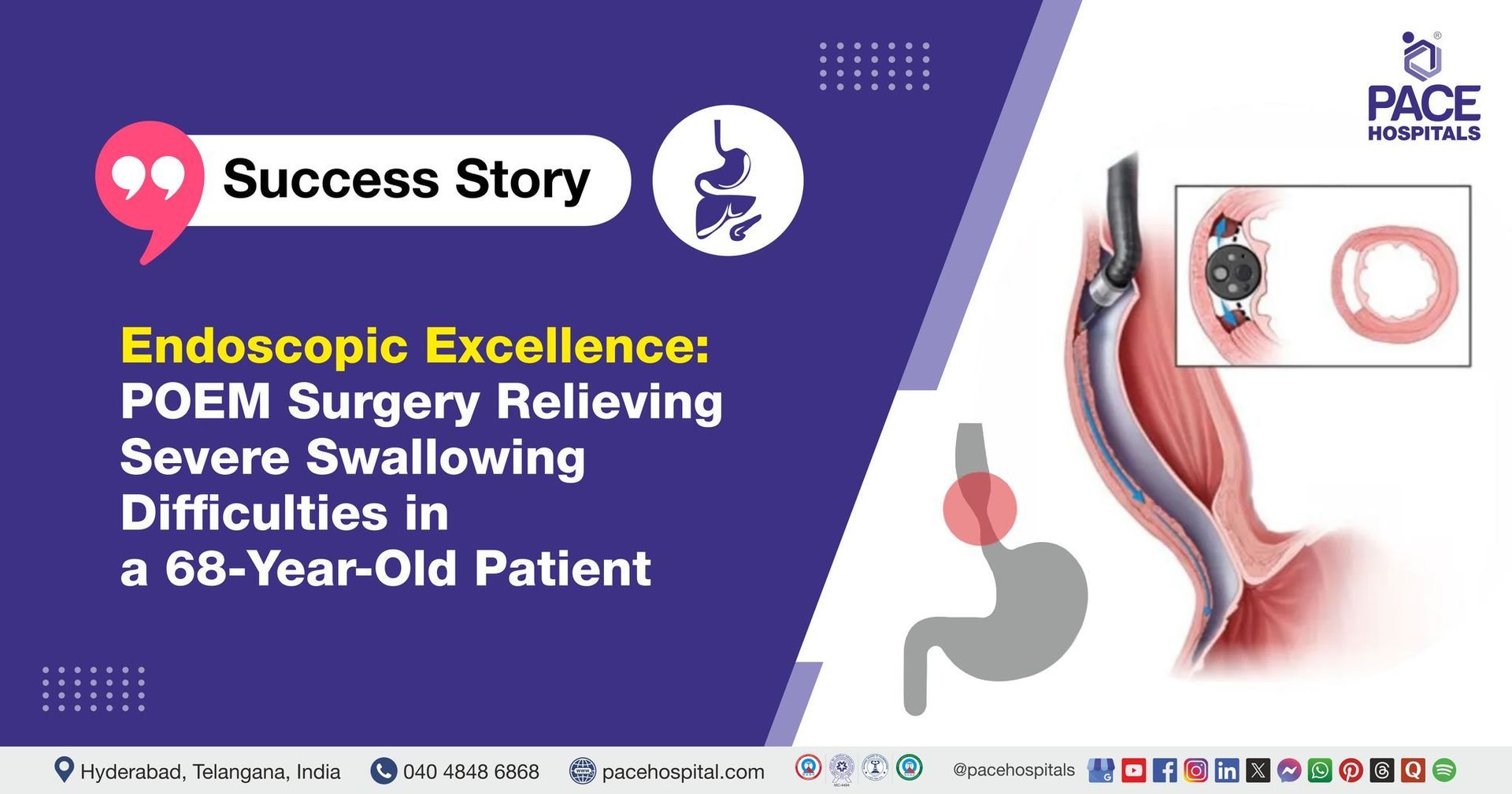Endoscopic Excellence: POEM Surgery Relieving Severe Swallowing Difficulties in a 68 Y.O. Patient
PACE Hospitals
The Gastroenterology team at PACE Hospitals successfully performed a Peroral Endoscopic Myotomy (POEM) on a 68-year-old female patient suffering from severe difficulty swallowing liquids and solids for the past four months. Diagnosed with achalasia cardia type II through oesophageal manometry, the minimally invasive procedure effectively alleviated oesophageal obstruction, enhanced food passage, and restored normal swallowing function.
Chief complaints
An adult female patient presented to
PACE Hospitals, Hitech City, Hyderabad with chief complaints that she had been experiencing difficulty in swallowing food and liquids for 4 months. These symptoms had significantly impacted her daily life, leading her to seek medical attention.
Medical History
The patient had no significant past medical history of gastrointestinal conditions, except for the recent onset of dysphagia. The patient’s history also indicated a progressive decrease in the ability to swallow food and liquids, causing significant distress and nutritional challenges.
The patient previously underwent a POEM procedure for achalasia cardia type II at some other hospital. However, despite the surgery, she continued to experience persistent or recurrent symptoms, indicating the possibility of an incomplete myotomy, post-procedure complications, or underlying motility disorders. The ongoing swallowing difficulties had a significant impact on her daily life, prompting her to seek further medical evaluation for appropriate management.
On Examination
Upon examination, the patient appeared stable and showed no signs of acute distress. She was conscious, cooperative, and well-oriented. Her vital signs were within normal limits, with a temperature of 98.3°F, blood pressure of 120/80 mmHg, pulse rate of 88 beats per minute, and SpO₂ of 99% on room air. A systemic examination revealed a soft, non-tender abdomen, with no signs of discomfort or palpable abnormalities.
Diagnosis
Diagnostic evaluations using upper gastrointestinal endoscopy (UGI) and oesophageal manometry confirmed achalasia cardia type II, a motility disorder marked by impaired relaxation of the lower oesophageal sphincter.
Prior to the POEM procedure, a chest X-ray (AP view) was performed to assess lung and heart health and rule out any pre-existing respiratory conditions.
Medical Decision Making (MDM)
Based on the clinical findings and investigation reports, the decision was made by the interventional gastroenterologist, transplant hepatologist, pancreatologist, and endocrinologist, Dr. Govind Verma, along with Dr. M Sudhir, to proceed with a Peroral Endoscopic Myotomy (POEM) to treat achalasia cardia, a minimally invasive procedure that helps alleviate symptoms by cutting the muscle fibers of the lower oesophageal sphincter.
In preparation for the planned procedure, the patient discontinued antiplatelet therapy for 10 days. This precautionary measure aimed to minimize the risk of bleeding complications during and after the intervention. The duration of antiplatelet cessation varies depending on the specific medication and the nature of the procedure.
Treatment
The patient underwent Peroral Endoscopic Myotomy (POEM), a minimally invasive endoscopic procedure. This technique involved creating a submucosal tunnel within the oesophageal wall to access the lower oesophageal sphincter. A precise myotomy was then performed on the circular muscle fibers, effectively alleviating the obstruction caused by the hypertonic sphincter. The procedure was successfully completed without intraoperative complications, ensuring optimal conditions for postoperative recovery.
Post-Treatment
The postoperative recovery was smooth, with no signs of infection or complications. The patient was initiated on IV fluids to maintain hydration and administered antibiotics to prevent potential infections. Supportive management, including pain relief, was provided to ensure comfort and promote recovery. Throughout the hospital stay, she remained hemodynamically stable, with no adverse symptoms such as fever, vomiting, or abdominal pain. Following a stable recovery, the patient was discharged in good condition.
Discharge medications
Upon discharge, the patient was prescribed antibiotics, proton pump inhibitors (PPIs), antiplatelets, and expectorants.
Discharge advice
She was advised to follow a clear liquid diet for the first five days, followed by a semisolid diet for the next ten days, before gradually transitioning to a soft diet.
Emergency Care
The patient was informed to contact the Emergency Ward of PACE Hospitals, Hyderabad if she observed any symptoms such as fever, abdominal pain, or vomiting.
Review notes
The patient was also advised to follow up with Dr. Govind Verma in the outpatient department after 7 days to review her condition.
Managing Bleeding Risks: Antiplatelet Cessation Before POEM
Antiplatelet medications are discontinued before a POEM procedure to reduce the risk of excessive bleeding during and after surgery. Since POEM involves creating a submucosal tunnel and cutting muscle fibers within the oesophageal wall, the procedure carries an increased bleeding risk, which antiplatelet agents can worsen by inhibiting clot formation. These medications are typically stopped several days before the procedure, depending on their half-life and the patient's overall risk factors. However, discontinuation must be carefully weighed against the risk of thrombotic events, requiring an individualized evaluation by the medical team. For instance, guidelines recommend stopping P2Y₁₂ receptor antagonists like clopidogrel approximately 5 to 7 days before high-risk endoscopic procedures to minimize bleeding complications. The decision to withhold antiplatelet therapy must be carefully assessed in consultation with the prescribing physician to ensure patient safety.
Share on
Request an appointment
Fill in the appointment form or call us instantly to book a confirmed appointment with our super specialist at 04048486868
Appointment request - health articles
Recent Articles











